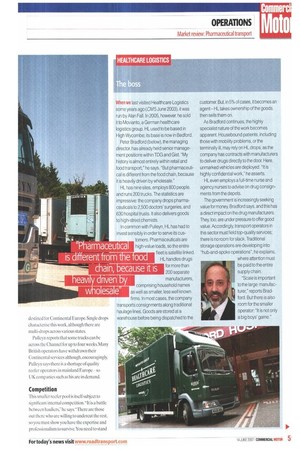When we last visited Healthcare Logistics some years ago (CM5
Page 55

If you've noticed an error in this article please click here to report it so we can fix it.
June 2003), it was run by Alan Fall. In 2005, however, he sold it to Movianto, a German healthcare logistics group. HL used to be based in High Wycombe; its base is now in Bedford.
Peter Bradford (below), the managing director, has already held senior management positions within TOG and Gist. "My history is almost entirely within retail and food transport," he says. "But pharmaceutical is different from the food chain, because it is heavily driven by wholesale."
HL has nine sites, employs 800 people, and runs 200 trucks. The statistics are impressive: the company drops pharmaceuticals to 2,500 doctors' surgeries, and 630 hospital trusts. It also delivers goods to high-street chemists.
In common with Pulleyn, HL has had to invest sensibly in order to serve its customers. Pharmaceuticals are high-value loads, so the entire fleet is satellite linked.
HL handles drugs for more than 200 separate manufacturers, comprising household names as well as smaller, less well known firms. In most cases, the company transports consignments along traditional haulage lines. Goods are stored at a warehouse before being dispatched to the chain, 'ecause it is customer. But, in 5% of cases, it becomes an agent— HL takes ownership of the goods, then sells them on.
As Bradford continues, the highly specialist nature of the work becomes apparent. Housebound patients, including those with mobility problems, or the terminally ill, may rely on HL drops, as the company has contracts with manufacturers to deliver drugs directly to the door. Here, unmarked vehicles are deployed. "It is highly confidential work," he asserts. HL even employs a full-time nurse and agency nurses to advise on drug consignments from the depots.
The government is increasingly seeking value for money Bradford says, and this has a direct impact on the drug manufacturers. They, too, are under pressure to offer good value. Accordingly, transport operators in this sector must field top-quality services; there is no room for slack. Traditional storage operations are developing into "hub-and-spoke operations", he explains, where attention must be paid to the entire supply chain.
"Scale is important to the large manufacturer," reports Bradford. But there is also room for the smaller operator: "It is not only a big boys' game."


























































































































































































